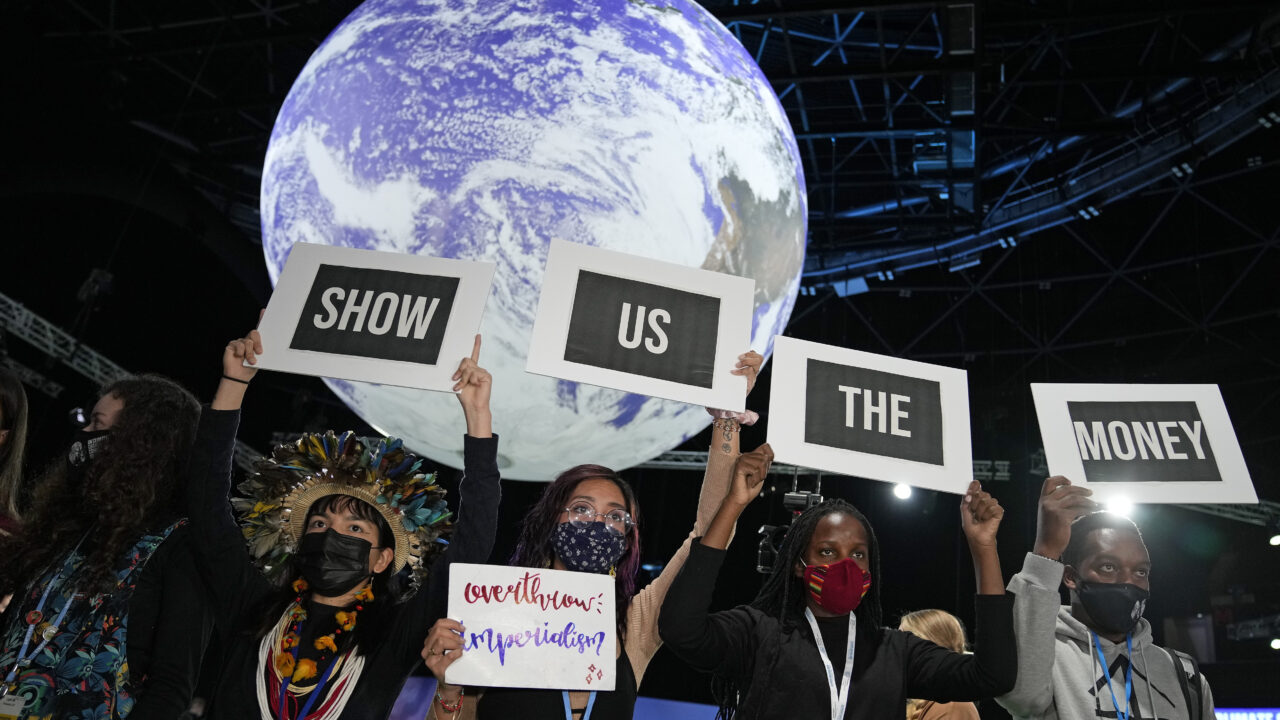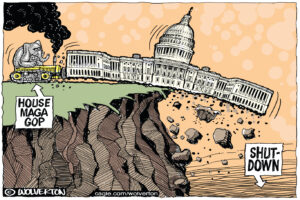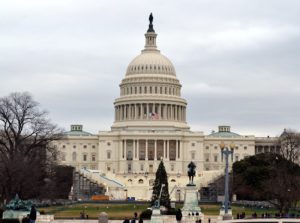Climate Change Is the Fight of Our Lifetime—It’s Time We Spent Our Money Like We Knew That
More than half of discretionary spending goes to the military. Only a tiny fraction addresses the most urgent threat to our security. Climate activists engage in a 'Show US The Money' protest at the COP26 U.N. Climate Summit in Glasgow, Scotland, Nov. 8, 2021. (AP Photo/Alastair Grant, File)
Climate activists engage in a 'Show US The Money' protest at the COP26 U.N. Climate Summit in Glasgow, Scotland, Nov. 8, 2021. (AP Photo/Alastair Grant, File)
As the hottest summer in human history approached its end, tens of thousands of climate marchers rallied in New York to call for bold climate solutions. Meanwhile, lawmakers in Washington lurched toward another fight over the federal budget.
More than ever, the U.S. needs to get serious about climate. And to do that, we need to re-prioritize what’s in that budget.
As it stands, more than half of the discretionary budget that Congress allocates each year goes to the Pentagon. Until the passage of the Inflation Reduction Act last year, the average taxpayer gave $2,375 each year to the military — and just $6 to renewable energy projects.
The Inflation Reduction Act marked the most significant commitment to reducing fossil fuel emissions in U.S. history. But it still falls far short of the need if we are to avoid the most devastating effects of climate change.
It’s time to reorder our federal budget priorities to address this global threat before it boils over any further.
Those ravages are already on display. In the United States, summer was a boiling cauldron of heat domes and wildfire smoke and awash with floods and tornadoes — all worsened by climate change. The deadliest wildfire in U.S. history claimed hundreds of lives in Maui.
The rest of the world suffered too.
Normally temperate parts of Europe roasted in the heat. Thousands of people have died and gone missing in Libya, where whole communities were washed into the sea by flooding. At our southern border, migrants escaping climate chaos throughout our hemisphere are seeking refuge only to be preemptively denied an opportunity to apply for asylum — a violation of national and international law.
Climate change is making each of these human disasters deadlier and more frequent.
It’s easy to feel overwhelmed by the scale and horror of it all. But the U.S. is in a unique position to contribute to solutions. As the wealthiest country in the world, we have the resources and knowledge to lead the way. We also bear the responsibility of having released more fossil fuel emissions over our history than any other country.
Unfortunately, our anemic contributions to global climate programs fail to meet either the need or our responsibility for this great threat to world security. Instead, in the name of security, we throw hundreds of billions of dollars every year into war and weapons.
The Pentagon itself is part of the problem. It’s the most carbon intensive institution in the world, responsible for 75 percent of federal government emissions.
This year, Congress looks likely to approve an $886 billion (or higher) military budget. But debate is nearly absent on increasing global climate aid, which last year totaled just $1 billion.
Worse still, the Pentagon itself is part of the problem. It’s the most carbon intensive institution in the world, responsible for 75 percent of federal government emissions. Boeing’s B-52 Stratofortress, for example, uses as much fuel in an hour as an average car driver consumes in seven years.
And the biggest Pentagon contractors emit even more than the Pentagon itself. Instead of looking for ways to reduce these emissions, some members of Congress are now making efforts to excuse Pentagon contractors from even reporting their emissions — a serious backstep in holding big-time industrial polluters accountable.
There can be no security without climate solutions. For our own safety and the world’s, we can and must do more. It’s time to reorder our federal budget priorities to address this global threat before it boils over any further.
Climate change is the fight of our lifetime. It’s time we spent our money like we knew that.
Your support matters…Independent journalism is under threat and overshadowed by heavily funded mainstream media.
You can help level the playing field. Become a member.
Your tax-deductible contribution keeps us digging beneath the headlines to give you thought-provoking, investigative reporting and analysis that unearths what's really happening- without compromise.
Give today to support our courageous, independent journalists.






You need to be a supporter to comment.
There are currently no responses to this article.
Be the first to respond.